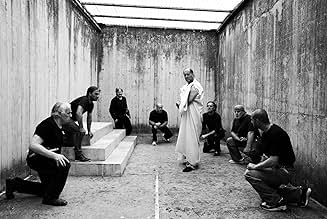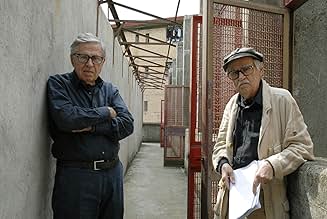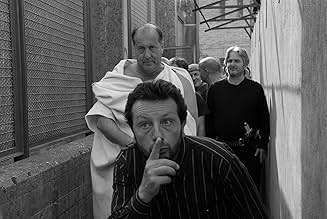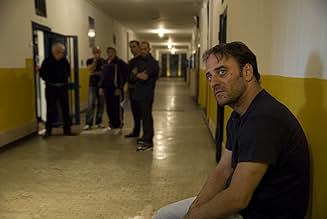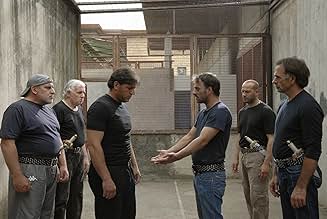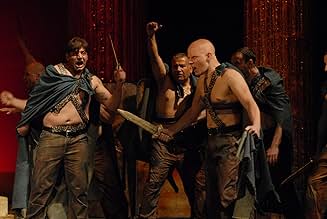NOTE IMDb
7,3/10
6,9 k
MA NOTE
Les détenus d'un quartier de haute sécurité d'une prison à Rome préparent une représentation publique du "Jules César" de Shakespeare.Les détenus d'un quartier de haute sécurité d'une prison à Rome préparent une représentation publique du "Jules César" de Shakespeare.Les détenus d'un quartier de haute sécurité d'une prison à Rome préparent une représentation publique du "Jules César" de Shakespeare.
- Réalisation
- Scénario
- Casting principal
- Récompenses
- 16 victoires et 21 nominations au total
Avis à la une
Taviani Brothers'2012 Golden Berlin Bear winner, saw the screening in this year's KVIFF, an intensely conceptual piece which recounts a play of "Julius Caesar"done by all-male prisoners. Shot entirely in Black & White, the film generates a certain art form extremity of blurring the boundary between play and film, and takes advantages of the indoor settings (which almost encompasses the entire film except for a few shots), the final result is gratifyingly diverting, both the film and the play-in-the-film.
I have only watched one Taviani Brothers' film before, ALLONSANFAN (1974, a 5/10). So I need to do more homework to comment on their style or expound on their near 60 years long walk- of-life. Simply single out this film, its artistic frontier has transcended other peers and condensed into a puristic absorption on the material itself, namely, the characters of the play and the individual prisoners who take on the roles, and strikingly their distinctions and similarities are undone in a yet refrained way. There are affluent theatrical nuisances in the film, although it only runs a scant 76 minutes, the film successfully conveys its ethos and every second counts.
Salvatore Striano stars the leading role as Bruto, his rough-edged dedication is imperfect but authentic, other supporters, the stand-outs are Cosimo Rega's Cassio and Juan Dario Bonetti's Decio, but by and large the amateur antics are put into the right place, and the absorbing original score by Giuliano Taviani and Carmelo Travia also lifts the film into a great adaption from Shakespeare's cannon. It's a true blessing to justify the fact that directors could surpass themselves even at their octogenarian years.
I have only watched one Taviani Brothers' film before, ALLONSANFAN (1974, a 5/10). So I need to do more homework to comment on their style or expound on their near 60 years long walk- of-life. Simply single out this film, its artistic frontier has transcended other peers and condensed into a puristic absorption on the material itself, namely, the characters of the play and the individual prisoners who take on the roles, and strikingly their distinctions and similarities are undone in a yet refrained way. There are affluent theatrical nuisances in the film, although it only runs a scant 76 minutes, the film successfully conveys its ethos and every second counts.
Salvatore Striano stars the leading role as Bruto, his rough-edged dedication is imperfect but authentic, other supporters, the stand-outs are Cosimo Rega's Cassio and Juan Dario Bonetti's Decio, but by and large the amateur antics are put into the right place, and the absorbing original score by Giuliano Taviani and Carmelo Travia also lifts the film into a great adaption from Shakespeare's cannon. It's a true blessing to justify the fact that directors could surpass themselves even at their octogenarian years.
Perhaps its the beautiful rolling sound of the Italian dialogue telling the story of Julius Cesar that made this enjoyable at least to the auditory sense. Perhaps it was that the language was sometimes amended to be more modern and meaningful. Perhaps it was the explained parallels of some of the prisoners experiences that helped to make the context more understandable. No matter, it was a thoroughly great way to start the Sydney Film Festival. The fact that this was a script within a script set in a prison using some real life prisoners didn't detract from anything in this film for me - I go to the cinema generally looking for a story, a fabrication, an unreality dressed in reality. I liked the gritty black and white, the sub-line of the prison life and setting. Yes, perhaps a prisoner saying he now felt caged etc didn't have to be said because it was obvious, but all in all a very enjoyable watch. I was engaged and participating from beginning to end. For me, one of the better versions of Julius/Shakespeare and a nice twist on an old but everlasting story.
It's rather discardable. The directing brothers were frustrated as they tried to create something as interesting as Kaos, Fiorile or Luisa Sanfelice. If this is up to the Golden Berlinese Bear, it's a sign of how low the level of current productions is. This is meta-theatre, set in Rebibbia, a high-security prison in Rome. The performers are real life convicts. "Cesar must die addresses the links between drama and reality , but working with amateurs didn't help. The film may be useful as kinda sociological propaganda, but it never qualifies as 'Cinéma vérité,' the meta-style of fiction-documentation filmmaking developed by Edgar Morin and Jean Rouch, inspired by the former theories about Kino-Pravda. I do call it a kind of Reality Show, though. Aren't Inmates Survivors & Big Brothers who are Keeping Up with the Roman Kardashians after all? ;-)
10ibarradj
I saw this at the Palm Springs Film Festival and was blown away! As soon as the movie began, I could tell it was a movie that I should pay attention.
The plot is a performance of Shakespeare's Julius Caesar by a group of real-life prisoners in an Italian prison. I loved how the prisoners could relate to the play by seeing the parallels in their own lives--the power lust, deceit and betrayal. The more the prisoners understood the play, the more they became immersed in their roles.
There have been many attempts to make Shakespeare palatable to the modern audience. This was my favorite iteration because it showed the actors trying to understand it, just as an audience might try to find the relevance. As a high school student, I found Shakespeare and Roman History boring. It wasn't until I hit my 40s did I realize this history was more violent than the Sopranos.
I don't know if this movie has ever been widely released. I highly recommend seeing it if it ever comes to your town.
The plot is a performance of Shakespeare's Julius Caesar by a group of real-life prisoners in an Italian prison. I loved how the prisoners could relate to the play by seeing the parallels in their own lives--the power lust, deceit and betrayal. The more the prisoners understood the play, the more they became immersed in their roles.
There have been many attempts to make Shakespeare palatable to the modern audience. This was my favorite iteration because it showed the actors trying to understand it, just as an audience might try to find the relevance. As a high school student, I found Shakespeare and Roman History boring. It wasn't until I hit my 40s did I realize this history was more violent than the Sopranos.
I don't know if this movie has ever been widely released. I highly recommend seeing it if it ever comes to your town.
The concept is very original, giving criminal prisoners the opportunity to produce a Shakespearer play in prison, the plsy being "Julius Caesar", and each prisoner allowed to speak in his own dialect. The result is a very stylistic and primitive alternative Shakespeare, mainly shown by rehearsals, and especially Brutus makes a very good performance. The text is considerably mutilated, only the action scenes are mainly presented, and there is not one woman in the whole performance. Still, it's an interesting representation, like all the films of the brothers Taviani are, and the main credit is the original angle. Most of the film is in black and white, to which the colour sections present a great efficient contrast. The theatre performance turns into a tremendous success, in spite of some arguments among the prisoners.
Le saviez-vous
- AnecdotesPaolo and Vittorio Taviani heard about the prisoners acting program and contacted Fabio Cavalli with the idea of doing Shakespeare's play and shot the whole experience.
- ConnexionsFeatured in Film '72: Épisode datant du 27 février 2013 (2013)
Meilleurs choix
Connectez-vous pour évaluer et suivre la liste de favoris afin de recevoir des recommandations personnalisées
- How long is Caesar Must Die?Alimenté par Alexa
Détails
- Date de sortie
- Pays d’origine
- Sites officiels
- Langue
- Aussi connu sous le nom de
- Caesar Must Die
- Lieux de tournage
- Sociétés de production
- Voir plus de crédits d'entreprise sur IMDbPro
Box-office
- Montant brut aux États-Unis et au Canada
- 76 908 $US
- Montant brut mondial
- 1 567 339 $US
- Durée
- 1h 17min(77 min)
- Couleur
- Mixage
- Rapport de forme
- 1.85 : 1
Contribuer à cette page
Suggérer une modification ou ajouter du contenu manquant


